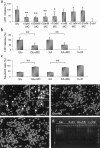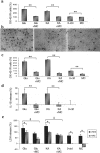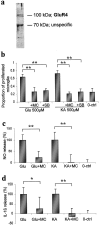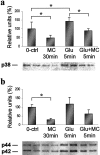Minocycline, a tetracycline derivative, is neuroprotective against excitotoxicity by inhibiting activation and proliferation of microglia
- PMID: 11306611
- PMCID: PMC6762519
- DOI: 10.1523/JNEUROSCI.21-08-02580.2001
Minocycline, a tetracycline derivative, is neuroprotective against excitotoxicity by inhibiting activation and proliferation of microglia
Abstract
Minocycline, a semisynthetic tetracycline derivative, protects brain against global and focal ischemia in rodents. We examined whether minocycline reduces excitotoxicity in primary neuronal cultures. Minocycline (0.02 microm) significantly increased neuronal survival in mixed spinal cord (SC) cultures treated with 500 microm glutamate or 100 microm kainate for 24 hr. Treatment with these excitotoxins induced a dose-dependent proliferation of microglia that was associated with increased release of interleukin-1beta (IL-1beta) and was followed by increased lactate dehydrogenase (LDH) release. The excitotoxicity was enhanced when microglial cells were cultured on top of SC cultures. Minocycline prevented excitotoxin-induced microglial proliferation and the increased release of nitric oxide (NO) metabolites and IL-1beta. Excitotoxins induced microglial proliferation and increased the release of NO metabolites and IL-1beta also in pure microglia cultures, and these responses were inhibited by minocycline. In both SC and pure microglia cultures, excitotoxins activated p38 mitogen-activated protein kinase (p38 MAPK) exclusively in microglia. Minocycline inhibited p38 MAPK activation in SC cultures, and treatment with SB203580, a p38 MAPK inhibitor, but not with PD98059, a p44/42 MAPK inhibitor, increased neuronal survival. In pure microglia cultures, glutamate induced transient activation of p38 MAPK, and this was inhibited by minocycline. These findings indicate that the proliferation and activation of microglia contributes to excitotoxicity, which is inhibited by minocycline, an antibiotic used in severe human infections.
Figures





Similar articles
-
Minocycline provides neuroprotection against N-methyl-D-aspartate neurotoxicity by inhibiting microglia.J Immunol. 2001 Jun 15;166(12):7527-33. doi: 10.4049/jimmunol.166.12.7527. J Immunol. 2001. PMID: 11390507
-
Minocycline blocks nitric oxide-induced neurotoxicity by inhibition p38 MAP kinase in rat cerebellar granule neurons.Neurosci Lett. 2001 Nov 23;315(1-2):61-4. doi: 10.1016/s0304-3940(01)02324-2. Neurosci Lett. 2001. PMID: 11711215
-
Potentiation of spinal glutamatergic response in the neuron-glia interactions underlies the intrathecal IL-1β-induced thermal hyperalgesia in rats.CNS Neurosci Ther. 2017 Jul;23(7):580-589. doi: 10.1111/cns.12705. Epub 2017 May 19. CNS Neurosci Ther. 2017. PMID: 28544775 Free PMC article.
-
The potential of minocycline for neuroprotection in human neurologic disease.Clin Neuropharmacol. 2004 Nov-Dec;27(6):293-8. doi: 10.1097/01.wnf.0000150867.98887.3e. Clin Neuropharmacol. 2004. PMID: 15613934 Review.
-
Minocycline and neurodegenerative diseases.Behav Brain Res. 2009 Jan 23;196(2):168-79. doi: 10.1016/j.bbr.2008.09.040. Epub 2008 Oct 11. Behav Brain Res. 2009. PMID: 18977395 Review.
Cited by
-
Microglia regulate the number of neural precursor cells in the developing cerebral cortex.J Neurosci. 2013 Mar 6;33(10):4216-33. doi: 10.1523/JNEUROSCI.3441-12.2013. J Neurosci. 2013. PMID: 23467340 Free PMC article.
-
Attenuating human fear memory retention with minocycline: a randomized placebo-controlled trial.Transl Psychiatry. 2024 Jan 17;14(1):28. doi: 10.1038/s41398-024-02732-2. Transl Psychiatry. 2024. PMID: 38233395 Free PMC article. Clinical Trial.
-
Differential involvement of trigeminal transition zone and laminated subnucleus caudalis in orofacial deep and cutaneous hyperalgesia: the effects of interleukin-10 and glial inhibitors.Mol Pain. 2009 Dec 21;5:75. doi: 10.1186/1744-8069-5-75. Mol Pain. 2009. PMID: 20025765 Free PMC article.
-
Differences in microglia morphological profiles reflect divergent emotional temperaments: insights from a selective breeding model.Transl Psychiatry. 2022 Mar 15;12(1):105. doi: 10.1038/s41398-022-01821-4. Transl Psychiatry. 2022. PMID: 35292624 Free PMC article.
-
Neuroinflammation, Oxidative Stress and the Pathogenesis of Parkinson's Disease.Clin Neurosci Res. 2006 Dec 6;6(5):261-281. doi: 10.1016/j.cnr.2006.09.006. Clin Neurosci Res. 2006. PMID: 18060039 Free PMC article.
References
Publication types
MeSH terms
Substances
LinkOut - more resources
Full Text Sources
Other Literature Sources
Medical
